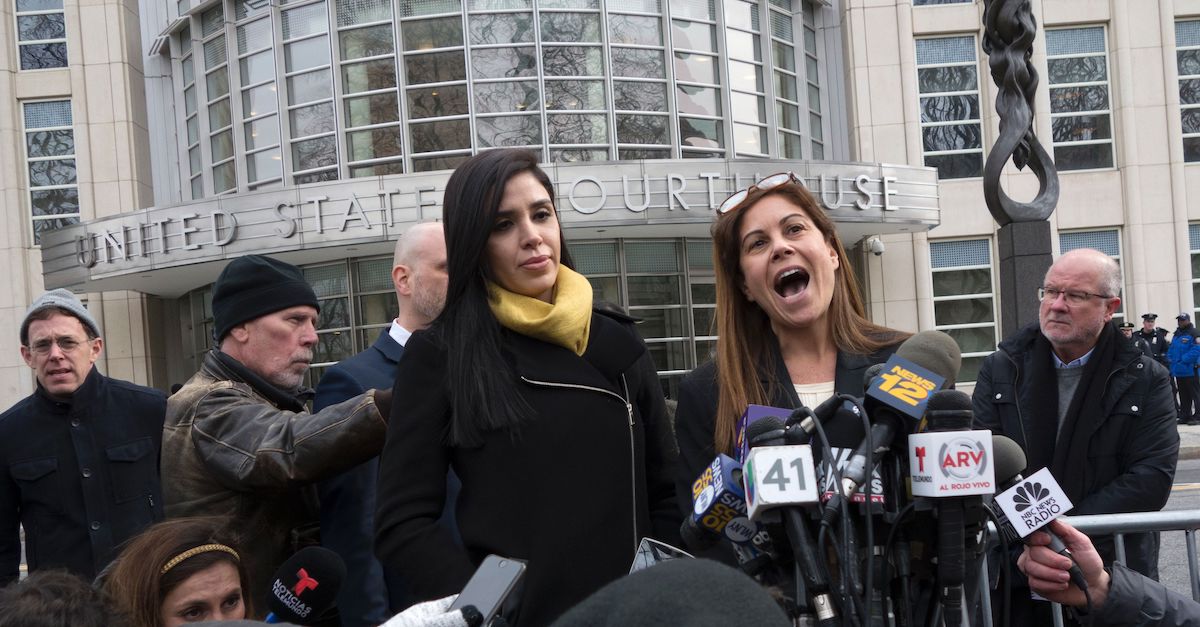
The wife of “El Chapo” Guzman, Emma Coronel Aispuro (L) listens as attorney Michelle Gelernt answers questions from reporters outside the US Federal Courthouse in Brooklyn after a hearing in the case of Joaquin “El Chapo” Guzman on Feb. 3, 2017 in New York.
Emma Coronel Aispuro, the 31-year-old wife of Mexican drug cartel boss Joaquín “El Chapo” Guzmán Loera, pleaded guilty during federal court proceedings in Washington, D.C. on Thursday morning to helping run her husband’s drug trafficking empire.
Arrested at Dulles International Airport in Virginia in February, Coronel admitted all three counts of a criminal information charging her with conspiring to distribute heroin, cocaine, marijuana and methamphetamine, conspiring to launder money and engaging in transactions and dealings of a designated foreign narcotics trafficker.
During the Thursday morning proceedings, U.S. District Judge Rudolph Contreras began proceedings probing Coronel’s competency to plead guilty, including whether she was addicted to and under the influence of any drugs.
Through a Spanish-language interpreter, Coronel replied that she was not.
Judge Contreras also reviewed the rights Coronel would be giving up through her guilty plea, and Coronel replied that she was aware of those consequences. The judge said that she signed a waiver of a jury trial.
Department of Justice attorney Anthony John Nardozzi read a statement of facts about Coronel’s actions, including her work as a “go-between” for the Sinaloa cartel and her work helping El Chapo escape from a maximum security Mexican prison.
“The defendant conspired with others including Guzmán’s son to facilitate Mr. Guzman’s escape from custody,” Nardozzi told the judge.
Coronel agreed that the factual summary was true and correct, and she confirmed that she understood the terms of a plea agreement with the government.
In court papers from the time of her arrest, the FBI said that Coronel “understood the drug proceeds she controlled during her marriage to Guzman were derived from [drug] shipments.”
“Coronel grew up with knowledge of the narcotics trafficking industry, and married Guzman when she was a teenager,” FBI agent Eric McGuire noted in an affidavit this year on Feb. 17.
“Coronel knows and understands the Sinaloa Cartel is the most prolific cartel in Mexico,” the affidavit alleges. “Coronel was aware of multi-ton cocaine shipments, multi-kilo heroin production, multi-ton marijuana shipments, and ton quantity methamphetamine shipments.”
Prosecutors believed that Coronel facilitated one of Guzmán’s dramatic escapes from the maximum security Altiplano prison in Mexico on July 11, 2015.
Citing a cooperating witness who claimed to be in the scheme, the FBI believes that Coronel passed on Guzmán’s message to his sons to buy a piece of land near Altiplano prison. Guzmán then instructed that cooperating witness to buy a warehouse near Altiplano prison as well as firearms and an armored truck, according to the FBI.
“Those present also discussed the need to get a GPS watch to Guzmán in prison in order to pinpoint his exact whereabouts so as to construct the tunnel with an entry point accessible to him,” the FBI’s affidavit states.
After Guzmán’s subsequent arrest in Mexico in January 2016, Coronel allegedly planned another, failed, prison escape attempting to foil El Chapo’s extradition to the United States next year.
Later convicted by a jury in Brooklyn Federal Court, Guzmán is now serving a life sentence in the most secure prison in the United States: a “Supermax” facility in Colorado.
The charges Coronel pleaded guilty to could carry a term of decades imprisonment and a 10-year minimum sentence on one of the counts, but the terms of her plea agreement have not been made public by press time.
Her lawyer Mariel Colon Miro told Law&Crime: “All I can say is that my client feels at ease with her decision, and she’ll be able to put this chapter of her life behind her and get on with her life.”
(DON EMMERT/AFP via Getty Images)